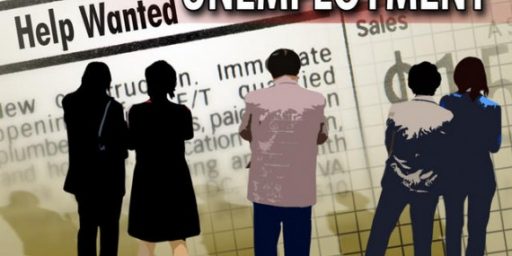The impact of a record: 46% of unemployed U.S. men have criminal convictions
Why clearing criminal records makes economic sense

As many OTB regulars know, for a number of years I worked specifically in and around the area of criminal legal system reform. In particular, my area of focus for most of the last two years has been “clean slate” legislation–the passing and implementation of laws that automatically seal certain criminal records when individuals meet certain criteria (typically a combination of the passage of time and avoiding recidivism). It’s estimated that 1 in 3 (or ~77 million) Americans have some form of a criminal record.1 The Brennan Center estimated in 2020 that more than 12.1 million Americans had been convicted of at least one felony and more than 45 million had at least one misdemeanor conviction.
It’s hard to overemphasize the impact of having a record, especially with the rise of the background check industry. Depending on your conviction you may lose your right to vote (either for a period of time or permanently). You may be restricted in where you can live (either for a period of time or permanently). Your record will also appear on every employment or volunteering background check for at least the next 7 years. And, in most states, there are few if any laws that prevent discrimination against people based on their criminal histories. For more details on the impacts of having a criminal record, see this fact sheet from the sentencing project.
As you’ll often hear from folks living with criminal records they are “last hired and first fired.” And all of those challenges have implications for both recidivism and the use of the social safety net.
We estimate that by age 35, approximately 64% of unemployed men [95% confidence interval (54, 73)] have been arrested at least one time for a nontraffic offense as an adult, and slightly more than 46% (38, 55) have been convicted at least one time for a nontraffic offense as an adult. As shown in the Supplementary Materials, the proportion is similar for samples that cumulatively include recently unemployed and discouraged workers (those who stopped searching for work but who had searched last year) and unemployed, discouraged, and involuntary part-time workers (those working part-time who would prefer full-time work).
https://www.science.org/doi/10.1126/sciadv.abj6992
In other words, the researchers estimate that 64% of unemployed men have been arrested, and 46% of those have been convicted. Additionally, they found that the rates of unemployment were consistent across racial groups with 67% of unemployed Black men, 58% of unemployed Hispanic men, and 65% of unemployed white men having a record. In other words, while racial biases exist in hiring, they appear to be trumped by biases against people with records. Science.org has a full summary of the methodology and findings here.
Of course, correlation is not causation. But it’s important to note that in 2020, a survey by the Professional Background Screening Association (PBSA) and HR.com that 93% of employers they surveyed reported conducting some form of criminal background check on potential employees. And there have been studies that demonstrate that even having an arrest, with no conviction, on a criminal record negatively influenced call-back rates for job applications. Likewise, a 2010 study found that by age 45, a formerly incarcerated individual who successfully enter the labor force on average earns $15,600 less per year than his peers who were never incarcerated, even when controlling for work experience lost during incarceration.
I understand that “tough on crime” readers may want to react with “they did the crime, they need to do the time.” However, in many cases, these individuals stopped “doing the time” years ago–meaning they completed the terms of their sentence and were released back into their communities. Studies like the ones in Science Advances demonstrate how even after their sentences are completed, punishment can continue for years and years thanks to the existence of their records. That means these individuals are more likely to need to utilize social services to survive and can be more prone to reoffense. Both of these factors lead to increased tax burdens on everyone (not to mention damage neighborhood safety).
Automatically clearing records is one way of helping alleviate some of these issues. Instead of placing the administrative burden on individuals to request that their records be cleared (a decision that is still left up to an individual judge), Clean Slate laws automatically clear eligible records. A number of states have passed, and are in the process of passing, such legislation including Pennsylvania, Delaware, Michigan, and Utah (where 500,000 people just had their records cleared). Unfortunately, this type of legislation still faces a lot of obstacles in many states (especially from “tough on crime” legislators). And at best, it’s only a partial solution to a much larger issue.
At some point we need, as communities, States, and a nation, need to have a serious discussion about community safety, punishment, and rehabilitation as our current systems are just not effectively delivering on any of the above (except punishment). In the meantime, evidence like this will continue to mount that major changes are necessary.
1. You don’t need to be convicted to have a criminal record; simply being arrested is enough. It’s also helpful to note that a “record” isn’t a single document. Rather it’s a collection of various agency records including, but not limited to, police and sheriff, jail, court, corrections, and FBI.
It’s also important to note that arrest records do not automatically go away in most states. This means that even if charges were never brought, that arrest will still appear on background checks for approximately 7 years (if not more on certain types of background checks). In my own research I have met people who have been denied professional licenses based only on the presence of an arrest–not a conviction.






(I think you mean “overemphasise”, not “underemphasise”.)
Thanks, Matt. I appreciate your willingness to keep doing the hard work, and to keep bringing it to the forefront. My record is 45 years old. I returned to society 42 years ago. The discrimination is real. It continues to restrict me and my family to this day.
@grumpy realist:
TY for that catch!
@Flat Earth Luddite:
I am sorry to hear that. Thank you for sharing your story. I know you know that you are not alone in dealing with that. But that doesn’t necessarily make the struggle much easier.
I hope other readers will ask themselves how does continuing to punish you for something that happened over a century ago benefit society?–especially if we claim to be a nation where people can get a second chance.
We long ago abandoned the concept of reform with regard to those who commit crimes and instead of substituted the concept of eternal punishment. Yet we expect that there will be no first time offenders to go along with the repeat offenders.
@Matt Bernius:
Matt, I’d note that my re-integration was (with my limited expectations) largely successful (at least prior to 9/11/01). I just wanted to stay out of prison and live my life quietly. Family and work were a dream. 20 years of success at that. Post 9/11, security/kabuki theater became standard. Laws restricting the arrested/convicted broadened. The ability to reintegrate the offender lessened. Opportunities for citizenship, housing, education and employment largely vanished.
From my perspective, we’re supposed to just shut the f*wk up, vanish and not bother the “good folks.”
For the most part, I’ve succeeded. But every once in a while, pot boils over, and I have to admit the underlying anger at how we’re treated is still there.
@Matt Bernius:
If we can forgive Henry Kissinger for the war crimes, I think we can forgive Luddite for whatever he did.
I mean, only certain people are punished half a century later, and it’s almost never the ones that should be.
Not to mention all the people who plead guilty (even tho they are in fact innocent) just to get the whole damned mess behind them.
@Flat Earth Luddite:
I honestly had not thought about the role of 9/11 in this, but that make sense–in part. because a lot of homeland security money was spent updating computer record capabilities. That in turn created a gold mine for data brokers.
@OzarkHillbilly:
That’s a very good addition to this. The Intercept just published a great piece of indepth reporting on this: https://theintercept.com/2022/02/22/murderville-texas-podcast-confessions/
@mattbernius: Not to mention that you just wrote a post about it.
I think what you’re seeing here is the inherent schizophrenia our society has over punishment. We’re trying to “get revenge” at the same time as we’re trying to “heal” people from doing criminal stuff in the future.
I admit I’m just as two-faced about it: I’m one of those who would be in some ways stricter on certain crimes, with more needed from the criminal to indicate he or she is in fact repentant, has taken steps to try to make amends to his victim, and has mentally changed so as to be less likely to repeat his previous crime–and at the same time more lenient: once you get out of jail your record is wiped. Completely. You’ve paid your debts, you’ve demonstrated you can be a good citizen, and yeah, we’re going to make damn sure you get a second chance.
However, as long as hiring an ex-felon opens a company up to liability if said ex-felon does anything, including driving over the yellow line–you’re going to have the present “winnowing out those who present risk” attitude. Ditto for the “hard on crime” politicians–they keep getting voted back into office because that’s what the public wants.
@grumpy realist:
I struggle with this, as I’m also admittedly two-faced about the issue.
I did time with guys that, given some support, would never re-offend, and would be productive contributing members of society. I’ve also known a number who were, literally, worth the price of a bullet. Or just putting them in a cell and welding the door shut. Feed them through the slot in the door.
But the constant drip, drip, drip is torture, and beneath the society we claim to be. If we can’t/won’t risk returning people to society, bullet in the back of the head would be a greater kindness, and a hell of a lot cheaper.
@Flat Earth Luddite: And not made any easier by a) the private prison economy b) the fact that we’re now using prisons as de facto institutions for the mentally ill.
@mattbernius:
Have you come across research that specifically looks at inequity within plea deals? I know you just posted about the trial tax. But I’m curious about research that limits the data to only pleas and looks at any differentials between demographics.
@Kurtz:
A frequent prosecutorial tactic is overcharging, as Matt has discussed in the past.
The overcharging is viewed as a p0sitive feature, not a bug. Ultimately, it’s designed to keep “them” in their place. As I say, it appears to be working per the shop manual.
Matt, you do realize that even framing the question in terms of the impact on unemployment marks you as a flaming (or even harsher adjective) liberal. Only liberals care about societal outcomes — conservatives care about enforcing moral codes. It doesn’t matter if everyone is worse off, so long as no moral hazard is created and nobody gets away with anything. (Of course, they really only enforce against the other, but that’s a separate problem…)
@DrDaveT:
If I was wearing my snarky hat, I’d point out that they’re only interested in enforcing moral codes on people other than themselves. But it’s late, and that’s a conclusion supported by the evidence.
@Flat Earth Luddite: @Flat Earth Luddite:
Yes, but that’s not really what I’m asking about.
I think we (OTB regs) intuitively think and can likely cite anecdotes that show various socioeconomic factors shape the outcome/s of an individual’s interaction/s with the CJ system.
I’m just curious about data how those factors shake out when limiting the set to plea deals.
@Kurtz:
Good question. There are studies. but they are extremely limited due to how much of a black-box plea deals are. Part of the reason for that is that they are only recorded in court data (which is the easiest to access) if they are accepted. Researchers rely on court data, because it is, across the board, the most publicly accessible of all criminal legal system data.
Even in cases where prosecutor data might contain what was offered (even if it wasn’t taken or retracted) the software rarely covers any previous offers, which means we cannot easily understand negotiations. Additionally, prosecutor data is much more tightly controlled (requiring FOIA requests to access, unless its willingly shared).
The Vera Institute on Justice released a metastudy on Plea Deals in 2020. They note the difficulty in studying plea deals in the introduction:
In terms of the disparities, Vera’s review found the following:
These findings backed up by studies in other places like Wisconsin: https://lawdigitalcommons.bc.edu/cgi/viewcontent.cgi?article=3659&context=bclr
Unfortunately, it’s only a handful of studies–which gets to a larger issue about how difficult it is to do a deep study of our exceptionally fragmented and opaque criminal legal system. This is something that should be deeply concerning to all Americans regardless of whether your concern is fairness or fiscal responsibility (the reality its its hard to quantify either).
@Kurtz:
I knew I was off target on your question, but it is a hobby horse of mine. Thanks for asking it!
@Matt Bernius:
Thanks again, Matt!
@Matt Bernius:
Thank you!